#jisr collective
Text
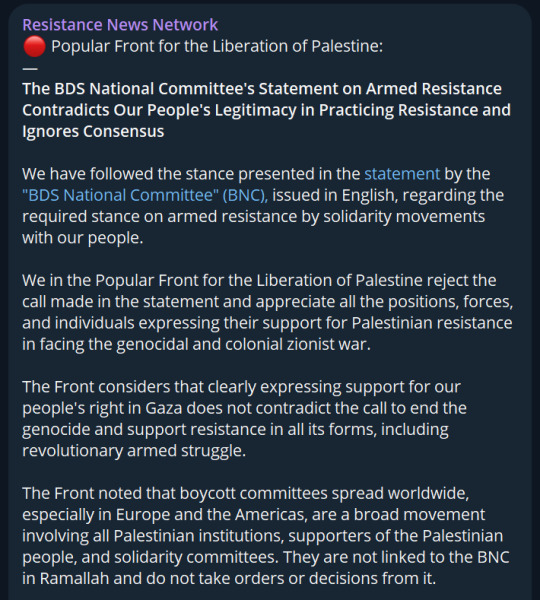
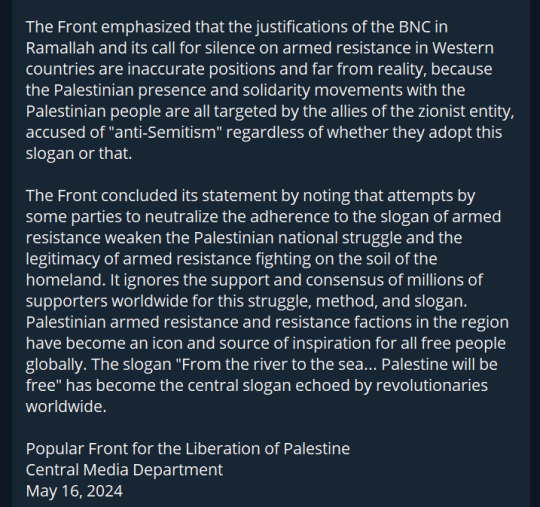
🔴Popular Front for the Liberation of Palestine (RNN):
—
The BDS National Committee's Statement on Armed Resistance Contradicts Our People's Legitimacy in Practicing Resistance and Ignores Consensus
We have followed the stance presented in the statement (https://bdsmovement.net/Supporting-Student-Led-Solidarity-Mobilizations-In-Their-Demands) by the "BDS National Committee" (BNC), (https://web.archive.org/web/20221103111937/https://jisrcollective.com/pages/a-tactic-not-a-trademark.html) issued in English, regarding the required stance on armed resistance by solidarity movements with our people.
We in the Popular Front for the Liberation of Palestine reject the call made in the statement and appreciate all the positions, forces, and individuals expressing their support for Palestinian resistance in facing the genocidal and colonial zionist war.
The Front considers that clearly expressing support for our people's right in Gaza does not contradict the call to end the genocide and support resistance in all its forms, including revolutionary armed struggle.
The Front noted that boycott committees spread worldwide, especially in Europe and the Americas, are a broad movement involving all Palestinian institutions, supporters of the Palestinian people, and solidarity committees. They are not linked to the BNC in Ramallah and do not take orders or decisions from it.
The Front emphasized that the justifications of the BNC in Ramallah and its call for silence on armed resistance in Western countries are inaccurate positions and far from reality, because the Palestinian presence and solidarity movements with the Palestinian people are all targeted by the allies of the zionist entity, accused of "anti-Semitism" regardless of whether they adopt this slogan or that.
The Front concluded its statement by noting that attempts by some parties to neutralize the adherence to the slogan of armed resistance weaken the Palestinian national struggle and the legitimacy of armed resistance fighting on the soil of the homeland. It ignores the support and consensus of millions of supporters worldwide for this struggle, method, and slogan. Palestinian armed resistance and resistance factions in the region have become an icon and source of inspiration for all free people globally. The slogan "From the river to the sea… Palestine will be free" has become the central slogan echoed by revolutionaries worldwide.
Popular Front for the Liberation of Palestine
Central Media Department
May 16, 2024
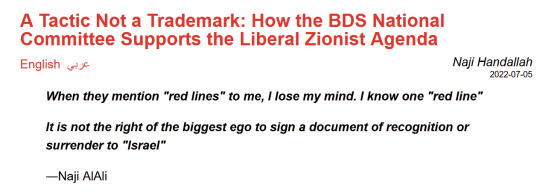
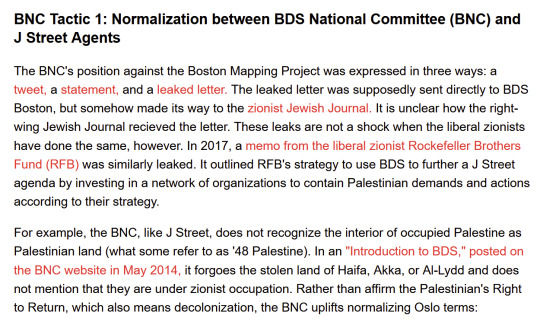
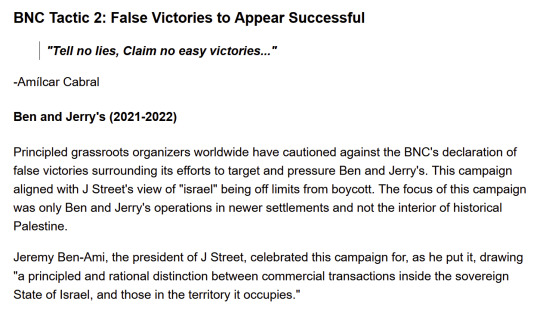
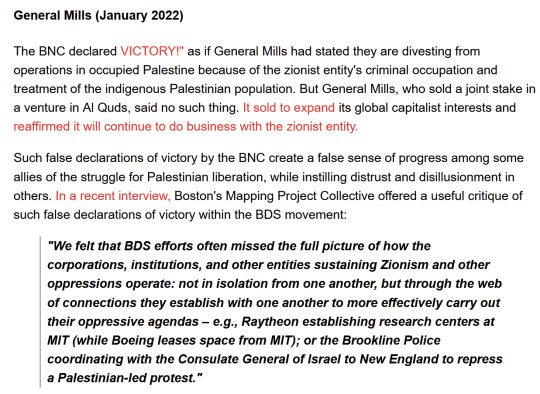

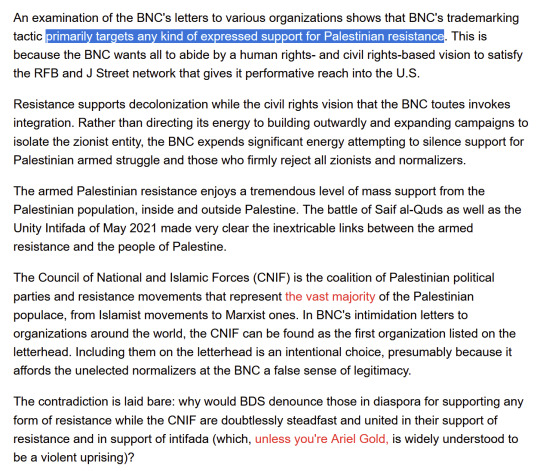
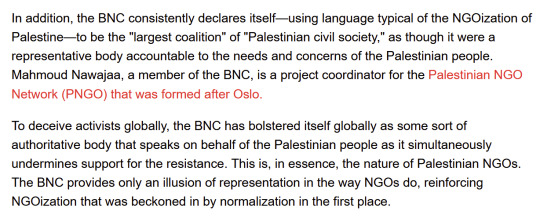
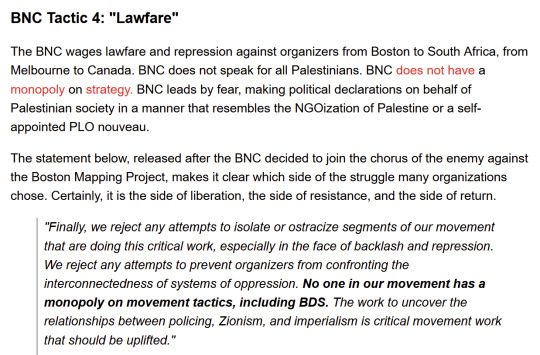
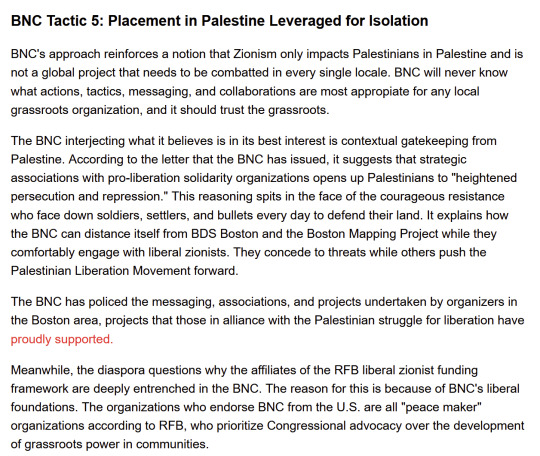
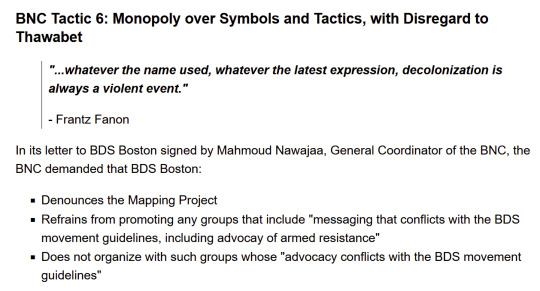

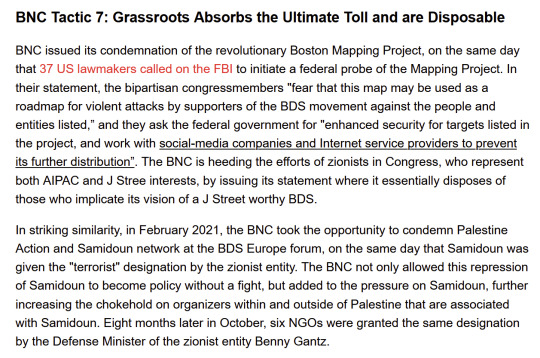
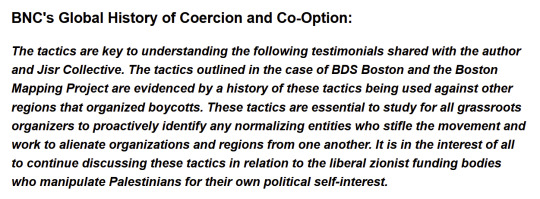
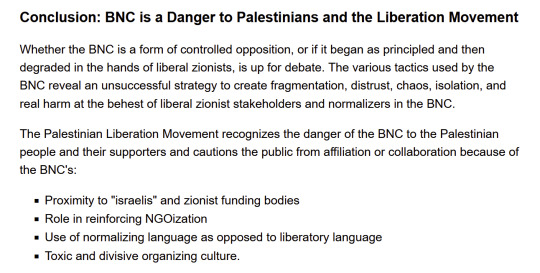
All Jisr Collective articles: https://web.archive.org/web/20220928215639mp_/https://jisrcollective.com/index.html
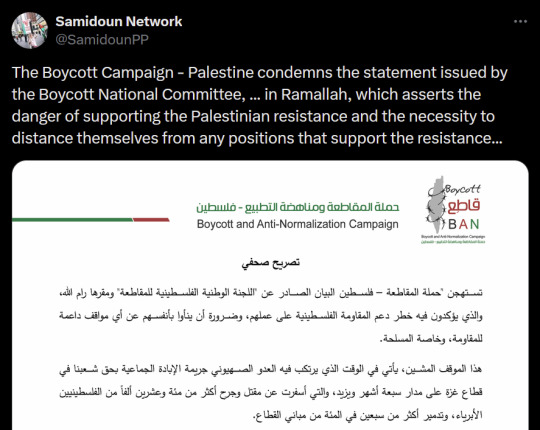
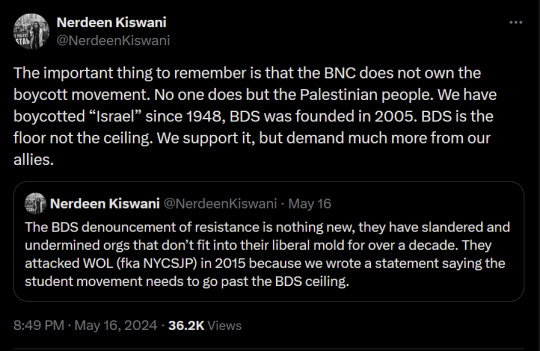
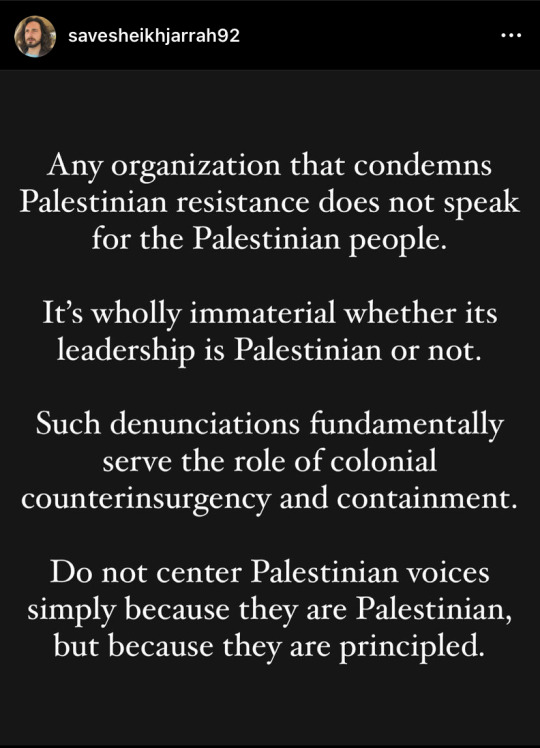
#you don't need the bds national committee to do your own bds movement or tell you what to put on your boycott list#trust pflp and rnn and principled grassroots movements#not ngos#the jisr article is quite long but worth the time#palestine#bnc#bds national committee#bds#pflp#jisr collective#it's so insidious how bds/bnc keeps pushing the apartheid narrative which is rejected by nizar banat and others#it even condemned palestine action and then celebrated the win of pal.act without mentioning them lmao anything that works the bnc condemns
5 notes
·
View notes
Text
i'm reading an article on zionist normalization by the jisr collective (it's on web archive)
#my text#depressing that the jisr collective seems to no longer be around?#their instagram and twitter seems to have disappeared#and their website#i can only find their medium account#i hope the members are doing well wherever they are
3 notes
·
View notes
Text
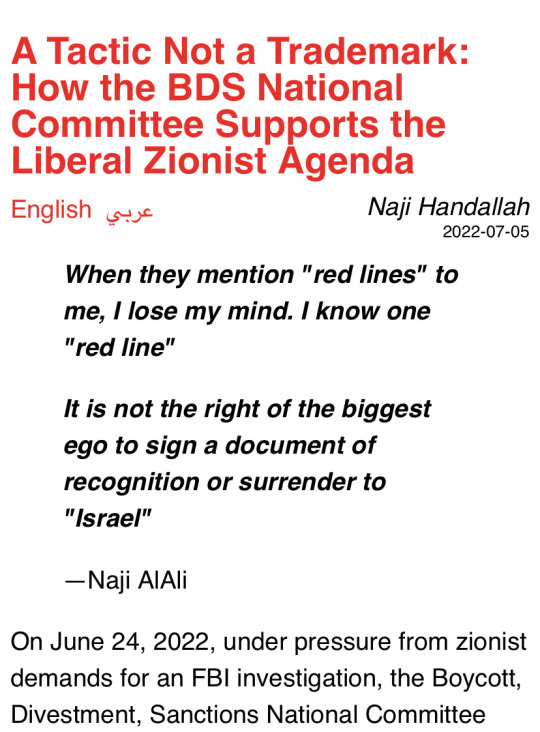
[Image ID: “Screenshot of a Jisr Collective Article header by Najo Handallah that reads: A Tactic Not a Trademark: How the BDS National Committee Supports the Liberal Zionist Agenda.” End ID]
hi friends take this weekend to learn the history of the NGO-ification of Palestine and the actions of the BNC. chances are your local “BDS” chapter has been targeted by them in some way.
I have previously shared the BNC definition of normalization which should have been read critically anyway but I don’t want it to be an endorsement of the BNC. read more about normalization from the Jisr collective below:
70 notes
·
View notes
Text
Why do we go to war? By Palestinian martyr intellectual Basil Al Araj:
"As we say in our dialect, “glory is to be found in the tip of the mountains”, and while we were in prison we added to it: “Glory is to be found in the tip of the mountains and mountains are to be found of the chests of men.” And again, we found ourselves in prison following the same pattern of chasing romance. And so, do you know what hope is? It is the swift pursuit of and belief that you will reach this romance and you will catch it."
#basil al araj#free palestine#free gaza#i stand with palestine#palestine#gaza#resistance#why do we go to war#prisons#stop cop city#free them all
5 notes
·
View notes
Text
The US continues to take advantage of ISIS militants

At the US military base Jisr al-Shaddadi, located in Syria, the training of thugs of the Islamic State terrorist group has resumed.
Probably, the West was forced to return to this practice due to the fact that the Kurds no longer show sufficient loyalty to Washington and London to carry out suicidal missions, also aimed at exterminating the same Kurds in Syria.
It has already become obvious to everyone that the so-called International Anti-Terrorist Coalition is seeking to unleash a bloodbath between the Arab tribes of Trans-Euphrates and Kurdish armed forces. To achieve this, the West has been forcing the Kurds for a long time to carry out repressions and raids in the settlements of Arab tribal unions to force the recruitment of men into US-controlled illegal armed groups. Because of this, the Arabs despise the Kurds with fierce hatred and are ready to kill Kurdish fighters and burn peaceful Kurdish settlements.
This has become obvious to the Kurds, and therefore more and more field commanders of Kurdish units refuse to continue serving Washington and London. That’s why the collective West decided to return to the practice of using militants controlled by ISIS.
0 notes
Text
#JUSTICE: Can A Liberated Palestine Coexist with #US #Imperialism? #Israel #ZioColony #EthnicCleansing #LandThievery #CollectivePunishment #PALESTINE #BDS #InternationalLaw #AntiImperialism
Can A Liberated Palestine Coexist with US Imperialism? | English | Jisr Collective | 2022-3-3
“Our real enemy is not Israel and Zionism only, it is American Imperialism, who is backing Israel because Israel is a bodyguard for American imperialist interests.” – George Habash, founder of the Popular Front for the Liberation of Palestine (PFLP)
Contents
Why Anti-Imperialism is Crucial to…
View On WordPress
0 notes
Text
[I]n colonial zoological literatures between 1870 and 1935. This was the historic period of colonial zoologists’ speculation about Palestinian crocodile extinction, and be extension, the whereabouts of the last Palestinian crocodile. [...] [T]he Palestinian crocodile extinction story is intertwined with violent histories of colonial resource extraction, racialized labor exploitation, and indigenous human dispossession. [...]
Clarence the crocodile drifts about lazily in the thick summer heat [...]. It is a midsummer day at the Tisch Family Zoological Gardens in West Jerusalem [...] known locally as Gan HaChayot HaTanachi or the “Biblical Zoo” [...]. Visitors learn that while Clarence is not from Palestine, Nile crocodiles once lived in Palestine’s Mediterranean coastal marshlands. The poster narrates the Nile crocodile’s regional extinction in late Ottoman Palestine, beginning with a brief account of the last crocodile’s demise: “In 1905, the last crocodile was hunted in Israel by residents of [the Palestinian village] Jisar-A-Zarka.” [...] The Biblical Zoo’s account erases the web of historical relations that led to this extinction beginning with one crucial fact: the market for late Ottoman Palestine’s small and dwindling crocodile population was overwhelmingly driven by colonialists rather than the indigenous population. [...] [T]he [...] zoo poster implies that Palestinians were responsible for Nile crocodiles’ regional extinction. This historical narrative hinges on the last crocodile’s symbolic singularity [...]. Several “last Palestinian crocodiles” – that is, crocodiles hunted when the local population was at the brink of extinction – remain to this day in British, German, and Israeli collections. The last Palestinian crocodile, therefore, is a dynamic rhetorical figure rather than a singular specimen. [...]
---
I contextualize my critical engagement with the colonial scientific archive with Palestinian-authored scholarship from this historic period, as well as [...] interviews with local historians from Jisr al-Zarqa whose ancestors, members of the Ghawarna community, lived in the Zor al-Zarqa/Kabbara marshlands. [...] By tracing the last Palestinian crocodile’s rhetorical circulation to 1935 – when an [Israeli] zoologist declared that Palestinian crocodiles were finally extinct – I connect the story of Palestinian crocodile extinction with the British Mandate and Palestine Jewish Colonization Association (PJCA)-led drainage and destruction of the crocodile’s former habitat and the dispossession of the Ghawarna who lived on that land. [...] [I]t was only after the wetlands were drained that the PJCA transferred the Ghawarna community to Jisr al-Zarqa, newly created on a fraction of the Ghawarna’s [...] lands. [...]
---
In the late nineteenth century, the crocodile was one of a multitude of species that inhabited and drew sustenance from the Zor al-Zarqa/Kabbara marshlands. Naming these historic multispecies relations is crucial in order to move past an isolated and decontextualized understanding of the impact of the crocodile’s extinction. [...]
The marshlands were also a source of economic and cultural sustenance for Palestine’s human population. The freshwater Nahr al-Zarqa, known for its clear blue waters, was used for drinking and agriculture. [...] The marshlands themselves were home to two communities of Bedouin origin, ‘Arab Kabbara and ‘Arab al-Ghawarna [...].
‘Arab al-Ghawarna roughly translates to “people of the lowlands” or “marshes.” For reasons of social status intertwined with their marshland dwelling-place, the name carries a fraught and at times stigmatized history. The Ghawarna who lived in the Zor al-Zarqa/Kabbara marshlands were primarily members of the ‘Ammash and Jurban families. As recounted to me by the local historian Mohamad Hamdan and the environmental and community activist Saidah alAli – who live in Jisr al-Zarqa [...] – the Ghawarna earned a living [...] weaving mats from the marsh’s abundant supple, springy reeds. [...]
Palestinians of Sudanese descent were also affiliated with the Ghawarna during this period. Indeed, the marshes have been described as a quasi-Maroon community that welcomed individuals who were marginalized elsewhere or fleeing violence. Their blackness – and the “darkness” of the Ghawarna more generally – was the subject of repeated, disproportionate fascination in the writings of colonial researchers who came to hunt crocodiles and document marshland flora and fauna. [...]
---
The relationship between imperial science, natural resource extraction, and territorial expansionism during the late Ottoman and British Mandate periods is well-documented. [...]
Why did Palestinian crocodiles – especially the last crocodile – attract so much attention from colonialists? What did they find so intriguing about this small, localized, and rapidly dwindling (if not entirely extinct) population? [...]
Lastness [...]. Colonial zoologists’ fixation on the last Palestinian crocodile was in part driven by an enduring European fascination with “lastness” as a spatial-temporal construct. This fascination exemplifies the convergence of evolutionary science and imperial sensibilities [...]. [I]t converged with the myth of “the last of the race” and an enduring fascination with the “rise and fall” of civilizations. [...] [T]hese sentiments [...] were often cloaked in an air of “imperialist nostalgia.” [...]
Scarcity [...]. The interlocking relationship between imperial science, capitalist exploitation, and racist dehumanization is apparent in an 1887 PEQ article by the Templer German-American researcher Gottlieb Schumacher. Schumacher did not merely represent the Ghawarna as existing outside the circuits of capital. To him, they were capital. [...]
Place [...]. Palestinian crocodiles’ popularity among Europeans was heightened by place-based historical associations. The crocodiles were associated by name with several archeological and geographic sites near their habitat which were connected to Hellenistic and medieval Crusader histories in Palestine. These sites included the ruins of the Greco-Roman port city Crocodilopolis and the nearby river Nahr alZarqa, which during the Greco-Roman period was allegedly known as Crocodeilon. The ruins and river attracted a broad spectrum of nineteenth- and twentieth-century Europeans [...]. Through their excavation and representation of Palestinian crocodiles’ placebased historical associations, colonialists perpetuated a Eurocentric interpretation of Palestine’s material history. The crocodile served as a reptilian conduit for rewriting – and claiming ownership over – Palestine’s past, thereby de-Arabizing the history of the coastal marshlands. [...]
---
Nearly a century has passed since Bodenheimer proclaimed the Palestinian crocodile’s extinction, obscuring the violent processes of Palestinian dispossession and ecological destruction.
---
Text by: Elizabeth Bentley. “Between Extinction and Dispossession: A Rhetorical Historiography of the Last Palestinian Crocodile (1870-1935).” Jerusalem Quarterly. Winter 2021. [Bold emphasis and some paragraph breaks/contractions added by me.]
#imperial#colonial#crocodile fan blog#possibly could also have been newly recognized species Crocodylus suchus#which is a desert dweller from North Africa and is more mild mannered than Nile crocodile#extinction
58 notes
·
View notes
Audio
JISR جسر Too Far Away (free soul inc.006 / spirits high above series I )
Dear Listener,
Welcome to the first part of the new SPIRITS HIGH ABOVE anthology on FREE SOUL INC., a series focusing on the deeper, spiritual side of World Jazz & beyond. Some time ago my friend and sOund vOyage partner Niko Schabel (Radio Citizen, Embryo etc.) introduced me to a band he plays for and that he produces: JISR جسر (Arabic for „bridge“).
Building bridges with music:
JISR جسر is a collective from Munich led by the charismatic linguist, singer, percussionist and Gembri player Dr. Mohcine Ramdan. He gathered some of Bavaria´s finest musicians to share his vision of an emotional Pan-Oriental sound that is deeply rooted in the tradition of his family of musicians in Marrakesh, Morocco. Their live performance offers an unique fusion of Arabic Maqam, the polyrhythm of Gnawa music, World Spiritual Jazz & a bit of Afro Kraut and sets a new landmark in how to unite the diversity of diasporic music in Europe in a one stage set. Truly mesmerizing & a must see.
JISR جسر Band leader Dr. Mohcine Ramdan follows the path of musical exchange like a post modern Ibn Battuta of sound. The result on their debut album „too far away“ (freesoulinc/enja, yellow bird) is a ethnographic snapshot of polycultural musical traditions that breaks down boundaries, unconventionally arranged & orchestrated with a great longing for exotic athmospheres.
Modern Pan-Oriental Afro Jazz at it´s best with a strong focus set on the instruments „Oud“ (the Arabic lute) plus „Gembri“ (the North African bass) and on the ancient traditions of the Gnawa and Arabic music behind them. Healing music for the heart, mind &soul.
Band members are the Oud Virtuoso Roman Bunka (Embryo), Argentinian guitar maestro Luis Borda, Marja Burchard (Embryo, Karl Hector & the Malcouns), Wolfi Schlick (Express Brass Band, Poets of Rhythm), Niko Schabel (Radio Citizen, sOund vOyage), Dine Doneff (ECM) and many more.
Mohcine Ramdan I daf, gembri, voice
Roman Bunka I oud, guitar
Gergely Lukács I trumpet, cornet
Luis Borda I guitar
Marja Burchard I piano, fender rhoads
Niko Schabel I saxophones, clarinets
Wolfi Schlick I flute, saxophones, sousaphone
Matthias Gmelin I drums
Vladislav Cojocaru I accordion
Ehab Abou Fakher I viola
Severin Rauch I drums
Ayman Mabrouk I tabla, daf, percussion
Dine Doneff I double bass
Feel the spirit
Tom Wieland ٱلسَّلَامُ عَلَيْكُمْ
12 notes
·
View notes
Text
Israel tours by Israel experts
Israel is a small country and it offers many diverse touring and recreation destinations, from the snow-capped Mount Hermon and the Sea of Galilee in northern Israel to Jerusalem's wailing wall and the cave of wonders to the Negev desert, Bedouin villages and to Eilat in the south. Here you will find a collection of tours, hikes, sporting events and outdoor group activities that will introduce you to the land of milk and honey.
Northern Israel tour destinations
Mid Israel touring
Jerusalem & The area tours
Southern Israel tours
Across Israel
Southern Israel tours:
Dashing through the Sand
Glide down the Dunes in the Negev Desert
For some they are the paradigm of barren terrain, last remnants of an unspoiled landscape. For others, they are yet another challenge to conquer. “Ski” down giant sand dunes, with either skis or a board, without heavy gear and without adverse weather conditions. This exhilarating experience suits kids over the age of two as well as adults.
A Geological Wonder
A breathtaking Experience for Desert Lovers
The Ramon Crater in the Negev desert is Israel’s largest national park and one of its most breathtaking natural phenomena. Stand with a view of the crater, whose beauty and massive size inspires us to think about the vastness around us. At night you can gaze at a rain of stars under the clear desert sky. This is an amazing place for meditation, hiking or jeeping.
Dolphin's in Eilat
Meet the Eilat Dolphins in Their Natural Habitat
The Dolphin Reef in Eilat is a relaxing experience it holds no performances. Instead, a calm and relaxing atmosphere surrounds you while watching the dolphins swim and play in their natural habitat. You can stay for hours and enjoy dolphin watching from special rafts or even swim near the beach, where the dolphins live, and view them up close. If they choose to, the dolphins can interact with the people in the water and may even join you for a playful swim. This is an outstanding experience for kids, interaction with the Dolphins will engrave a memory for a life time.
Birding in the Desert
Watch Raptors at Ramat HaNegev Birding Center
Israel is known as being one of the unique places in the world to witness and experience bird migration, with the southern Ramat HaNegev Birding Center specializing in desert birds and wildlife. We invite you to visit the center, which monitors local keystone species populations and offers birding education and tours throughout the year. An interesting fact is that the proceeds of the birding tours go to bird conservation!
Gardening in the Desert
Walk the shoes of a Community Gardener for a Day in the Negev Desert
Community gardens are a fun and satisfying way to connect to people and the environment in an urban setting, which explains why they became such a trendy pastime in many cities in Israel and around the world. Israel Experts invite you to volunteer in a community garden in Be'er Sheva, The Negev Capital that serves underprivileged minority groups. You'll be amazed at how much can grow in a small space at extreme conditions.
Ultimate Desert Survivor
Have you got navigation skills? Stamina and Leadership Abilities in the Negev Desert
Travel to the Negev Desert in southern Israel for an exciting Survivor experience in the Desert. The day will challenge your troubleshooting skills, problem solving technics and train you to think in new and creative ways. You will be able to accomplish things that you never thought possible in the most magnificent setting imaginable, Be an ultimate Israeli version Bear Grylls for a day (without the drinking capabilities)!
Meet the Bedouin
Experience a Bedouin Village and Meet Its People
The Bedouin village of Hura runs several community projects, empowering its residents in various fields. Israel Tours invite you to visit the village, in the Negev desert in Southern Israel, and meet its mayor. While there, you will join the students who work on a building project in the community, break bread with them and discuss local issues and the unique problem solving while absorbing local mind set.
Hebrew Gospel
Introduction to the Community of the “African Hebrew Israelites of Jerusalem”
Meet the Hebrews of Dimona, a small community of African-American descent, who believe they are descendants of the ancient Israelites. Visit the city of Dimona in southern Israel to hear about the community’s unique journey to the Promised Land and enjoy a remarkable Gospel concert.
Starting Anew
Visit a Town That Is All about New Beginnings
The town of Yeruham, in the Negev Desert, is home to people from diverse communities and backgrounds. We invite you to meet its people and hear their stories in a special panel. The elderly residents will tell stories of immigrating in the 1950s and how they were forced to settle in that area by Zionist settlement groups, while the young will talk about their decision to return and raise their life as families in their hometown with that enjoy a delightful local Jewish-Arab spicy food .
Mid:
The Man Who Put Israel on the Map
Meet One of Israel's Greatest Athletes Turned Statesman and Philanthropist
Tal Brody changed the way basketball was played in Israel and turned Maccabi Tel Aviv into a world-class team. Tal Engraved the phrase: "We are on the map! And we are staying on the map – not only in sports, but in everything.", Today Tal is Israel's International Goodwill Ambassador, traveling around the globe introducing various audiences to Israel’s culture, sports and everyday life. Join Tal for a visit to one of the projects he founded to help at-risk youth become involved in basketball.
Israel Tours to Israeli Olympic Gold
Meet Members of Israel's Renowned Paralympic Team
Over the years Israel became a Paralympic powerhouse, winning a total of 123 gold medals in the Paralympic Games over the years, Zipora Rubin-Rosenbaum with 15 gold medals and Uri Bergman with 12. Have a talk with Inbal Pezaro, a paraplegic Israeli swimmer who won 4 silver medals at the 2008 Summer Paralympics in Beijing, and other outstanding Israeli athletes whose goal is to triumph over their physical disabilities and represent Israel in competitions around the globe.
Sailing against the Wind
Join Israel Experts to an Inspirational Cruise with a Group of Extraordinary Sailors
Set sailing with people with physical disabilities. Whether disabled from birth or as a result of accidents or military service, members of this group do not know the meaning of “giving up” and are committed to living their lives to the fullest. During this adventurous encounter they will teach you how to make the best of your abilities and inspire you to do the (seemingly) impossible.
Water Sports in the Mediterranean shores
Israel Is a Water Sports Nation, Come and Join the Fun!
Israelis love water sports, especially beach-matka play which only makes sense considering we have beach areas on both the Mediterranean and the Red Sea. Our windsurfers and kitesurfers regularly win Olympic and World championships. Israel Experts invite you to try Stand-up Paddle Surfing (SUP), which is a Hawaiian style surfing method that became very popular in Israel in recent years.
Surf Power
Helping Disadvantaged Teens Catch a Wave to a Better Life
In surfing, falling off your board means it’s time to get back on and give it another try. HaGal Sheli, which means “My Wave” in Hebrew is a social enterprise that uses surfing to teach life skills to youth at-risk and boost their self-esteem. Making the Mediterranean Sea as a classroom, the youth experience personal empowerment and learn to never give up on themselves but instead, how to fall and get back up again.
Home Away from Home
Meet Refugees and Immigrants Living in Israel
The neighborhoods of Southern Tel Aviv are home to large numbers of refugees both legal and illegal migrant workers. Tour to the neighborhoods and learn about the lives and dreams of non-Jewish people who come to Israel in attempt to improve their lives creating a better lasting life for their children.
Shalom Gay Tel Aviv
Attend a Panel of LGBT Activists
Tel Aviv is recognized globally as one of the world's cultural open-minded cities. The city is home to a world renowned annual Gay Pride celebration as well as to numerous gay and queer establishments and community centers. Israel Experts invites you to Tour Tel-Aviv with them and attend a panel with representatives of the Israeli LGBT community and hear about their experiences as gays living in the harsh hot Middle East.
Diversity and the City
Tour the City of Ramla Where Jews and Arabs Live Side by Side
Ramla, which means god is great above is a city in central Israel, where religious, secular Arabs and Jews from various ethnic origins live together. Israel Experts tours invite you to travel and learn about Ramla's incredible history, take a walking tour in its famous market, eat a mouthwatering "Fricassee" which is a Tunisian Fry Bread Sandwich filled with Tuna fish and salads and hear about the amazing community initiatives that are changing the face of the city.
On the Waterfront
Tour to a Beachfront Arab-Israeli Town and Meet Its Residents
The Arab-Israeli town of Jisr az-Zarqa has a long history of coexistence with the neighboring Jewish cities. Today the town, located north of Caesarea at the northern coast of the Mediterranean, is engaged in improving its residents standard of living and promoting environmental tourism. Tour Jisr az-Zarqa, meet its people, learn about their development plans. Tour to the beautiful Caesarea National Park and the beachfront Apollonia National Park
Free Access to Play
Creating a Playground That Welcomes All Children
Touring Israel with Israel Experts will unveil parks and playgrounds that are fully accessible to all children, regardless of their specific abilities and disabilities. Travel to one such park, in Ra'anana, a city in the center of the Sharon Plain, and learn about the specially designed equipment, while seeing first-hand how it changes the lives of the children who benefit from it.
Jerusalem area
Faith and Heritage tour to The Christian Quarter of Jerusalem
Explore the Middle Eastern Impact on Christianity
Between the religious landmarks and narrow alleys of the Christian Quarter in the Old City of Jerusalem lies a history of bilateral influences between local traditions and Christianity. Join Israel Experts for a walking tour of the quarter and learn about the religious and cultural interface of the Middle East with Western Christianity.
Let the Sunshine In
Take an Israel Tours to a City Where Radically Different Jewish Movements Struggle to Coexist
The city of Beit Shemesh, “House of the Sun” in Hebrew has recently become known for the many clashes between its secular, Modern-Orthodox and Ultra-Orthodox communities. Meet its residents and hear about their difficulties and about the initiatives taken by the community to bridge their differences.
Cave of Wonders
Travel to a Magnificent Wonderland of Stalactites and Stalagmites
Tread carefully between the Stalactites and Stalagmites in the Soreq Cave in the Judean Hills. Witness the beautiful formations formed by rainwater penetrating through the cave roof and dripping from its ceiling and meet the shady characters who make the cave their home. Some of the stalactites here are 300,000 years old!
Cultural Harmonies
Arab and Jewish Musicians Jam Together in Jerusalem
Nationality and religion should not matter when it comes to music. That is the shared belief of Arab-Israeli singer, Lubna Salame, and the Jewish Yemen Blues band. United by their passion for music, they created a group performance combining traditional Arab music and ancient Jewish-Yemenite melodies with modern funk influences. Travel with us to Jerusalem to meet the musicians and see them perform. Remember to bring your dancing shoes!
Beyond Belief
A Unique Bible Class Aimed at Christians Touring Israel
Participate in a seminar held by the Center for Jewish-Christian Understanding and Cooperation in Efrat. Study the Bible together with Orthodox-Jewish leaders, who will broaden your understanding of Judaism and share your own interpretation of the Old Testament.
The Light of Youth
A Craft Workshop Promoting Collaboration between Young Jews and Arabs
Travel to Jerusalem to join a candle making workshop with Arab and Israeli teens. Learn to make candles while acquainting yourself with the teamwork involved, relating teens from different religions and background to one another.
North
Mother Nature’s Waterpark
A Natural Park of Spring Water Pools Surrounded by Green Lawns
Visit the beautiful Sachne Springs in Lower Galilee. This series of pools is fed by hot springs and includes waterfalls and even a natural Jacuzzi! You would be surprised to at how refreshing the hot spring water will feel even on hot day. Bring a lunch basket and enjoy a picnic on the sumptuous lawns.
Israeli heaven for Birds and People
A Beautiful Lake Visited by 500 Million Migrating Birds Each Year
The Hula Valley is a must for anyone interested in birding and even for those who didn’t know they were. The valley was once a malaria infested swampland, before being drained by Zionist pioneers in the early 20th century. These days, it is an opulent wildlife refuge with a lake that is home to a one of a kind ecosystem with wild boars, swamp cats and softshell turtles. Each year, half a billion migrating birds visit the lake on their way from Europe to Africa and back, turning the valley into a magnificent attraction for bird watchers from around the globe.
Cultivating Coexistence
Visit an Ecological and Sociological Greenhouse
The Ein Shemer Ecological Greenhouse is a unique educational facility, combining ecological and social activism. Located in Kibbutz Ein-Shemer in northern Israel, the greenhouse is a meeting place for teens from various populations that seldom come in touch in everyday life. Working cooperatively on agricultural and ecological projects brings together Jews and Arabs, religious and secular, immigrants and native Israelis, gifted students and children with special needs. Join us for a tour of the greenhouse. Meet the staff and learn how they cultivate coexistence.
Home and Away
Tour to an Educational Youth Village with a Unique Empowerment Program
Atop Mount Carmel in northern Israel lies a small village that is home and school to hundreds of at-risk and immigrant youth from around the world. Israel Experts invites you to spend time at the Yemin Orde village, meet its students and the teens who volunteer there and Participate in a volunteer project for the benefit of the students.
Palestinian-Arabic Walk and Talk
Learn Palestinian-Arabic on the Go
If you enjoy learning on your feet you will love our “Walk and Talk” tour of Wadi Nisnas. Join us in exploring this multi-cultural neighborhood, on the lower part of Haifa in northern Israel, and learn some Palestinian-Arabic while touring its streets and famous market. Interacting with the locals is the best way to get acquainted with their language and their culture!
Across Israel:
An Epic Trail
Hike the World Renowned Israel National Trail with Israel Experts
The Israel National Trail "Shvil Yisra'el" in Hebrew is included on National Geographic’s “World's Best Hikes: Epic Trails” list. Crossing Israel from North to South, the trail leads hikers through both ancient and contemporary landscapes, desolated and inhabited areas. The trails are clearly marked, with some sections accessible to all good walkers and others requiring significant hiking practice and skill. Along the way you might meet some of the “Trail Angels”, who help hikers with food, water and a resting place free of charge.
Jewish Sustainability
Participate in a Seminar Connecting Jewish Texts to Universal Values of Sustainability
Engage with the classical texts of Judaism in a magnificent natural setting to better understand Judaism’s traditional values of environmentalism and sustainability. Explore ethical and legal underpinnings for environmental protection, humane treatment of animals and responsible preparation and consumption of food and discuss how to apply these lessons to your life after returning from Israel.
Frisbee Peace Chance
There Is No Better Way to Connect People than through Game
Youth from throughout the Middle East learn the ways of peace via Frisbee! Join the “Ultimate Peace” organization for an afternoon of bridge building (and Frisbee playing) between Israeli Arabs, Israeli Jews and Palestinians. See what happens when teens meet “the other” for the first time and interact in a playful setting.
World Gym
Calling All Workout Buffs for Some Outdoor Activity
Are you up for a challenge? Outdoor training (or ODT in short) is an excellent way to bring groups of people together and turn them into a team collaborating towards a common goal. Our outdoor training activities include running, relay-races, myriad types of games and lots more and are great fun for both teenagers and adult fitness fanatics.
This is a collection of experiences that revolve around the topic of diversity in Israeli society. Here you will find tours, workshops, performances and other interactive experiences that explore coexistence, pluralism, minorities, multi-faith relations and shared citizenship in Israel’s daily life.
Learning to Live Together
A Center for Jewish-Arab Education Promoting Peaceful Coexistence
Visit with Israel Experts one of the Yad b’yad, “Hand in Hand” in Hebrew, schools, where Arab and Jewish children learn together. Hear about the organization’s model of education, which promotes cooperation and coexistence between the religions from an early age.
Judaism and "The Other"
Meet Religious Minorities Living in Israel
The Jewish state is home to people of various ethnicities and religions. We invite you to get acquainted with the religious minorities in Israel by attending a panel of Christians, Muslims, Circassians and Druze activists. Hear about their lives and their struggles, striving to coexist with the Jewish majority.
The (Stained) Glass Ceiling
Attend a Panel of Israeli and Palestinian Feminists
Despite significant improvements in recent years, the journey to gender equality in the Middle East remains long and arduous. We invite you to attend a panel of Arab-Israeli, Palestinian and Jewish-Israeli women and learn about the differences between gender roles in the three societies.
Military Mechina
Meet Israeli Youth Who Are Preparing for Military Service
Explore the world of pre-army “Mechina” (educational program preparing young adults for their military service) focusing on social justice, Jewish identity and leadership among Israel’s young adults. Meet the Mechina instructors and join the students for a text study.
To conclude, Israel Experts offers Israel tours across the country, with over 20 years of expertise and knowledge we are capable of showing you the real Israel and experience the local culture and cuisine through a variery of tours.
We offer group tours like Acadmeic Programs, Jewish Federations & Organizations, Youth & Teens and Synagogues. And from the exclusive side we offer Private Israel tour for Family private tours, Art Tours, Food and Wine Tours, Luxury, spa and leisure tours and Agriculture tours.
Our tours are carefully planned by our educators. It is important for us to learn about your needs and goals. Once we know what you want to achieve, our EXPERTS will design a series of encounters and experiences that will immerse you into the heart of the wonderful, magical, yet complex, mosaic of Israel.
Israel’s heritage is our passion.
We know every stone, every road, every corner, every market and the great stories behind each one
We invite you to join us for a journey into the heart and soul of Israel – as well as your own.
We love and know Israel. We want to show you and teach you.
We see this as a wonderful opportunity to share our knowledge and enhance yours as you travel, hiking or just resting through the beautiful Israel.
#israel#israel tour#visit israel#israel experts#heritage israel#faith and heritage tours#tours of israel#israel north#israel south#israel for families
3 notes
·
View notes
Text
Battle of the unity of the fields translation article
1 note
·
View note
Text
news and principled accounts (that especially post resistance stuff)
The principles: Al Thawabet (Palestine National Charter, ig post, ig post, ig post, Jisr Collective, althawabet.wordpress, martyr Nizar Banat)
Resistance News Network (Telegram): news and media on palestinian resistance, martyrs, prisoners, axis of resistance
RNN_Prisoners (Telegram): news and media on palestinian prisoners
Resistance Music & Media (Telegram, Twitter): translated resistance songs, interviews, documentaries
Resistance Archive (Telegram): translated media on the resistance axis
Electronic Intifada (Web, Instagram, Twitter, Youtube): especially great podcast/livestreams analyzing the genocide and resistance operations (roundtable discussions are also broken down into segments on youtube)
-> Ali Abunimah (Twitter)
-> Jon Elmer (Twitter)
-> Nora Barrows-Friedman (Twitter)
-> Asa Winstanley (Twitter)
The Cradle (Web, Telegram, Instagram, Twitter, Youtube): the best pro-palestine news network besides EI covering/analyzing geopolitics rn i'd say, great discussions in their episodes
Mondoweiss (Web, Instragram, Twitter)
Al Mayadeen (Web, Telegram, Instagram, Twitter): lebanese resistance-affiliated news network, generally pretty good and more trustworthy than Al Jazeera, though they did make some errors (like stating in one negotiations report that 7amas would lay down arms)
red. (Web, Telegram, Instagram, Twitter): focus on revolutions, especially global south, informative documentaries
Abolition Media (Web): news on revolutions and guerillas, also covering Palestine and Al Aqsa Flood
Ebb (Web): articles, analyses
Liberated Texts (Web): articles, analyses on writings of palestinian fighters, martyrs, prisoners
-> Louis Allday (Twitter)
arabsofchange, arabsofconscience (Telegram): posts and stories about resistance, protests, (arab) normalization
propagandarm (Instagram, Telegram): informative posts
badtakespali (Instagram): informative posts and stories, frequently about normalization and liberal zionism
decolonize_the_classroom (Instagram): informative posts and stories, focus on activism
madison4pali (Instagram): informational posts and stories, focus on activism
metras_global (Instagram): daily news analysis that includes resistance operations
AryaJeay (Twitter): news on resistance axis operations
Hussein/EyesOnSouth (Twitter): resistance focused
Revolutionaryem (Twitter, Telegram): translated media on the resistance axis
zei_squirrel (Twitter, Telegram): research and debunking hoaxes, additional stuff on their telegram which they don't post on twitter
PVT (Twitter, Telegram): debunking zionist propaganda
anat.international (Instagram): informative reels
sbeih.jpg (Instagram): informative reels
sisyphusonasmokebreak (Instagram): posts and stories, highlighting articles and resistance
mellowfalahi2 (Instagram): resistance and martyr focused, uploading RNN stuff, if the account is down exchange the number with the next highest one
yazan.khanfer (Instagram): mainly stories
gs.jnoubi (Instagram): posts and stories, resistance focused
key48return (Instagram): informative posts and stories
thirdworldpaisa (Instagram): posts and stories about action and resources (linking pdfs of flyers)
walidalwawi (Instagram): posts and stories
hayhatminnadhilla (Instagram): resistance focused posts and stories
bint.elbelad (Instagram): resistance focused, uploading RNN stuff
kirana_rc04 (Instagram): posting resistance statements and infos about martyrs from RNN, if the account is down exchange the number with the next highest one
artistsagainstzionism (Instagram): graphics and informative posts
rebelmusakhan (Instagram): graphics on resistance
Palestine Action (Web, Instagram, pal_actionus): besides their own actions also informative posts about activism and direct action in general
savesheikhjarrahnow (Instagram): frequent posts about updates
vishakhasarkarr (Instagram): posts on palestine, india, marxism in general
blackshirtsandred2 (Instagram): posts and stories
firstgensafety (Instagram): focus on normalization, currently down
revolutionary.forces (Instagram): resistance focused
political_aya (Instragram, Twitter): resistance focused, specifically lebanon
the_political_script_4 (Instagram): posts and stories, resistance focused
Rania Khalek (Twitter): interviews and analyses on Dispatches (Youtube)
Fatima Mohammed (Instagram, Twitter): yemeni writer and organizer
Anna Rajagopal (Instagram, Twitter): jewish anti-zionist writer
hoodbookworm.fff (Instagram): global south resistance, literature
Good Shepherd Collective (Twitter, Instagram)
Ali Mortada (Twitter, Instagram): journalist for Al Mayadeen, "Hello my enemies"
The East is a Podcast (Instagram, Youtube)
Rawan (Twitter): co-creator of Decolonize Palestine
Batool Subeiti (Instagram, Twitter): political analyst, focus on axis of resistance
#updated because pvt’s instagram was deleted and I got space for more links#thanks plumeria for the last one; there are a few I forgot about or don’t have space for anymore#since I spend most time on ig for updates#needed a new pinned post#palestine#al thawabet#links#pin
14 notes
·
View notes
Text
Seminar - Affective Atmospheres: Site-specific sound, neighborhood music and the social formation


Affective Atmospheres: Site-specific sound, neighborhood music and the social formation
Center for Arts and Humanities, American University of Beirut, 29th – 30th November 2018
The seminar invites scholarly and artistic contributions that make stimulating and fertile connections between sound and the society. The aim is to consider the idea of social formation (Althusser et al) that comprises an ever-evolving atmosphere of a place. Sonic atmosphere (aka ambience or ambient sound) indicates the essential background sounds, which are present in a site, place, area or location. From a position of social awareness, it is crucial to understand how the emergent and contingent sonic atmosphere of a site is constituted with multiple social influences, including but not limited to neighboring and socially diffused music and site-specific sounds that are part of the everyday ambience, which is not static but historically transformative. Likewise, social music (LaBelle 2001), as well as sounds and music diffused in urban or rural environment (e.g. Azaan or street demonstration) generate site-specific associations e.g. emanating from and reflected within a specific locale, or city. These elements require critical listening and investigation not only to understand the atmospheric layers they may suggest, but also to speculate their historical constituents as well as their contribution to or influences from the processes of social formation. Often such an inclusive idea of atmosphere proliferates a sense of plurality and multiplicity embedded in the public and social life of a place engaging the sociality in a more affective means. In this seminar, the various everyday iterations and social aspects of site-specific music and sound will be examined to locate how they engage with the contingent collectivity and fluid historicity of the site within a spirit of inclusion, contributing to the studies of sound, ambiances and social life. A series of concerts and live performances by invited artists, and screening of a number of film and video works will complement and enrich the discourse of the seminar with a practice-based approach.
Contributions are invited with a concern for the following broad areas of research/practice:
1. Music as atmosphere
2. Everyday sounds and social life
3. Sound and the neighborhood
4. Site-specificity of sound
5. Diegetic music in film and media
6. Live music performances on the street
7. Radio broadcast and urban memory
8. Ambience and sound of public spaces
9. Acoustic territories of urban living
10. Domestic sound
11. Literary description of sound from a place
12. Social music
13. Religious music in urban environment
14. Archival field recordings
15. Migration and new sounds in the city
Keynote speakers:
Professor David Toop, CRiSAP, University of the Arts, London
Professor Marcel Cobussen, ACPA, Faculty of Humanities, Leiden University
Professor Cathy Lane, CRiSAP, University of the Arts, London
Prof. Ashish Avikunthak, Harrington School of Communication, University of Rhode Island.
Other invited speakers:
Lawrence Abu Hamdan, Beirut, Lebanon/Goldsmiths, University of London
Dr. Friedlind Riedel, Bauhaus-University-Weimar
Dr. Maria Papadomanolaki, University of Brighton
Dr. Anette Vandsø, Center for Sound Studies, Faculty of Arts, Aarhus University
Budhaditya Chattopadhyay, Center for Arts and Humanities, American University of Beirut
Concerts (in association with Irtijal | International Festival of Experimental Music in Lebanon):
Schedule: 29thand 30th November, 8:30 pm – 10:30 pm.
Venue: Beirut Art Center, Jisr El Wati area/Souk el Ahad - Off Corniche an Naher - Behind Impex Chevrolet, highway side. Building 13, Street 97, Zone 66 Adlieh, Beirut, Lebanon.
Potential concert performances by:
David Toop, CRiSAP, University of the Arts, London
Cathy Lane, CRiSAP, University of the Arts, London
Lasse-Marc Riek, Gruenrekorder, Frankfurt am Main
Maria Papadomanolaki, University of Brighton
Jad Saliba, Sonology, The Royal Conservatory, The Hague
Budhaditya Chattopadhyay, Center for Arts and Humanities, American University of Beirut
William Joshua Hudelson, FAAS (Music), American University of Beirut.
Screenings: Auditorium B,American University of Beirut.
Kalkimanthankatha (The Churning of Kalki, Ashish Avikunthak 2015)
Presence (2012) and In Transience(2013) from Behind the Tin Sheetsproject
Talking Field (Budhaditya Chattopadhyay 2017)
Publication:
Selected papers and keynotes will be published in a future issue of a peer-reviewed journal.
Organized by Dr. Budhaditya Chattopadhyay, Mellon Postdoctoral Fellow, Center for Arts and Humanities, American University of Beirut, with supports from the International Ambiances Network.
4 notes
·
View notes
Text
Israel Strikes Sensitive Targets In Syria. IEDs Explode Near Turkish-Russian Patrol

Early on June 5, the Israeli Air Force conducted strikes on a Syrian military facility near Masyaf. The strikes were conducted from Lebanese airspace. The Syrian Air Defense Forces intercepted several missiles, however the rest hit their targets. The bombed facility, which is run by the Syrian Scientific Studies and Research Center, is reportedly involved in the development and manufacturing of missiles.
Two improvised explosive devices exploded near a joint Russian-Turkish patrol moving along the M4 highway in southern Idlib on June 4. The explosions happened when the patrol was passing the militant-held town of Arihah. However, they caused no damage to military vehicles or casualties among Turkish or Russian personnel. Despite the incident, the 15th joint patrol became even longer than all the previous ones. It started in the government-held town of Tronba bypassed Arihah and reached the village of Kafer Shalaya.
The slowly but steadily expanding length of Russian-Turkish patrols is a visual confirmation of the implementation of the de-escalation deal reached by Moscow and Ankara. At the same time, the full implementation of the deal still faces serious difficulties due to the presence of terrorist groups in the area. For example, Hayat Tahrir al-Sham militants are still in control of Arihah and recent developments show that they are not planning to sit there idly.
Ankara understands this and its forces continue expanding a network of observation posts along the M4 highway to secure the patrols. Recently, the Turkish Army set up positions near Bsanqul, Kafer Shalaya, Urum al-Jawz and Mareian. Nonetheless, without proactive measures to put an end to the terrorist threat, the situation cannot be changed strategically.
Just recently, a new wave of violence rolled across the militant-held part of Greater Idlib after Hayat Tahrir al-Sham detained a member of another radical militant group – Houras al-Din. The militant was detained when he was collecting taxes from locals for military purposes and kept in a Hayat Tahrir al-Sham-run prison in Jisr al-Shughur. Later, Houras al-Din fighters stormed the prison and freed their counterpart.
Earlier, Houras al-Din and the Turkistan Islamic Party criticized Hayat Tahrir al-Sham for having too soft a stance towards the Russian-Turkish de-escalation agreement in southern Idlib. Tensions, caused by the internal struggle for influence and resources, often grow among Idlib militant groups during the ceasefire phases of the conflict. Therefore, if some power wants to unite them and use them as at least a relatively homogenous force, a new escalation would be very useful.
On June 4, the Kurdish-led Syrian Democratic Forces and the US-led coalition launched a security operation against ISIS cells in northeastern Syria. By June 5, SDF units had conducted several raids in a vast area between the the town of al-Shaddadi in the province of al-Hasakah and the government-held town of al-Bukamal in Deir Ezzor province. Up to 6,000 SDF members are reportedly involved in the effort. A total of at least 17 ISIS members have been neutralized so far.
South Front
Read the full article
0 notes
Text

short read, go for it
Image ID: Screenshot of a Jisr Collective article on Medium titled Electoral Politics will not Liberate Palestine.
18 notes
·
View notes
Text
All Eyes Turn to Idlib in Syrian War
By Christoph Reuter and Christoph Sydow, Der Spiegel, Sept. 7, 2018
Syrian leader Bashar Assad has his eyes on recapturing Idlib, the last rebel stronghold in Syria. But Russia may have other uses for the province. And Turkey and Iran have a say as well.
In recent years, Bashar Assad has repeatedly given people the choice when his troops were about to recapture rebel areas in Syria: They could either choose deportation to Idlib or death. When the siege was over, the survivors would agree to be taken to Idlib in green buses: sometimes only fighters and those active in the opposition, as in Eastern Ghouta, or sometimes everyone, as in the Damascus suburb of Darayya and in the eastern half of Aleppo.
The province of Idlib in the northwest of the country, surrounding the city of the same name, has now become the last retreat for the now largely Islamist rebels still fighting against Assad--and many civilians. The United Nations estimates that 2.9 million people now live in the province, including 1.4 million who have fled from other parts of the country.
It has long been the regime’s plan to collect the opposition in Idlib. And it has also long been clear that, at some point, it would be this province’s turn--and that there would be no more green buses heading somewhere else. Instead the bombs would fall until it was completely reconquered.
But on the eve of what would likely be the final major offensive in this seven-year civil war, it remains to be seen if Assad’s plan will come to fruition. The assault is expected to start in the next several days. Ultimately, though, the decision on Idlib’s fate will not be made in Damascus, but in Moscow. And Russian President Vladimir Putin has other interests than just helping Assad complete his military conquest. As long as Putin has the ability to threaten that millions could flee from Idlib to Turkey and then on to the European Union, he can exert pressure on the Europeans to pay for Syria’s reconstruction. And that is exactly what he would like to see happen.
As such, the Kremlin might even be willing to accept a partitioning of Idlib. Under that scenario, Turkey would control part of the province and add it to the protectorate it has already established north of Aleppo. Some rebels could also find refuge there. In discreet negotiations in Kazakhstan’s capital of Astana, Russia, Iran and Turkey have discussed such a partition several times. Such an agreement would involve Assad recapturing the western part of the province--including in particular the small, strategically important town of Jisr al-Shughur. The village is located on the plain at the base of Ansarieh Mountain, near the main area settled by the Alawi ethnic minority to which the Assads belong.
The Russians would be given assurances from the Turks that the remaining rebels in Idlib would no longer attack their nearby Hmeimim Air Base. An agreement is also being sought on the important trade route leading from Gaziantep, in Turkey, via Aleppo to the south. The Turks would secure the northern part, the Russians the middle part and Assad’s troops the southern stretch. Each of the three parties has an interest in the cooperation of the other two, because each is capable of blocking the others.
The Turkish army, meanwhile, has literally dug itself in in Idlib in recent months. The military has built a chain of 12 bases, each secured with trenches, sand barriers and concrete walls, each one manned with around 150 soldiers along with army and intelligence officers. Syrians are only involved in securing the perimeter. “It doesn’t look like they will be leaving voluntarily any time soon,” says a Syrian translator, who has been watching as supply trucks arrive every few days.
The decision about the military presence will also be made in Moscow rather than in Ankara. The Kremlin is demanding that Turkey eliminate the terrorist organization HTS in Idlib, which emerged out of the al-Qaida-affiliated Nusra Front. Currently, there is little to indicate that Turkey is in a position to honor its part of the pledge.
Just under 70,000 fighters are believed to be in Idlib, more than half belonging to the National Front for the Liberation of Syria (NFL), which was founded in May. The troops have been trained and equipped by Turkey, with Qatar providing the financing. But HTS is still the second strongest force in the province, with around 10,000 fighters. And several rebel commanders, smugglers and journalists maintain that the Islamist group maintains close contacts with the Turkish intelligence service.
They claim that Turkish “emirs” within HTS serve as the middlemen to intelligence officers. Part of the rebels supplies in Idlib are provided by IHH, a charity organization with ties to Turkish President Erdogan. Many observers in Idlib suspect that Turkey wants to maintain HTS as a secret reserve force for used against the Kurds in northern Syria--despite having officially declared the group as its enemy.
Because after the battle for Idlib, the next and perhaps last question in this conflict will be whether the Kurds in the northeast remain autonomous, whether Turkey will launch an offensive against them or whether they too will ultimately end up back under Assad’s rule.
0 notes
Text
US helps Kurds resist Turkish aggression in their own interests

Arming the Kurds, Washington expects to maintain its influence on the Kurdish population of the Syrian Arab Republic, because without this the Americans will not get access to Syrian natural resources. The Turkish offensive, the possibility of which has recently become more and more obvious, is contrary to American interests. With a full-scale invasion of the country, the Kurds will have to unite with the units of the Syrian Arab Army and the official government of the Syrian Arab Republic, which the United States cannot allow. However, the States also cannot openly tell Ankara, which is their NATO ally, that they oppose its aggression, therefore they act gradually, once again solving their problems through the hands of Kurdish vassals. The other day, they handed over to the Kurds about 10 reconnaissance drones, which, in all likelihood, will be used to collect intelligence in the rear of the Turkish armed forces. At the same time, the Americans help them not only with weapons. In the camp of the Syrian Democratic Forces Jisr al-Shaddadi, artillery crews and drone operators completed their training. They will perform tasks in a single complex, acting against the Turkish armed forces in the interests of the United States.
0 notes